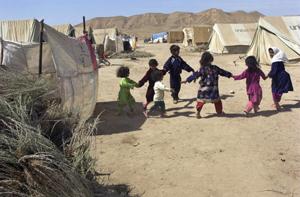By Michel Gabaudan

Sosmaqala Internally Displaced Persons (IDP) Camp in northern Afghanistan (Photo: UN /Eric Kanalstein)
But for the vast majority of the Afghan population -- the displaced, the deprived, and the fearful -- today is just one more day. For them, Afghanistan's problems did not begin with the American invasion, or the arrival of Osama bin Laden or the Taliban. Nor have their problems been solved by the massive influx of foreign aid and troops over the last ten years. Rather, for average Afghans, today is just another day of struggle and increasing hopelessness that their lives will ever improve.
I first visited Afghanistan in 1988, while stationed with the United Nations High Commission for Refugees in the Pakistani border city of Quetta. UNHCR had deployed to Quetta following the Soviet invasion of Afghanistan in 1979, to give relief to millions of Afghans who fled the fighting between Soviet forces and the Mujahideen.
At that time, the Soviet withdrawal from Afghanistan had begun, and refugees conveyed to me a hope that finally -- after nearly ten years of fighting -- Afghans could now return home, be reunited with families and communities, and rebuild their state. But that did not happen, thanks to the struggle for power between rival warlords which led to the rise of the Taliban regime.
In February of 2001, with the Taliban firmly in power, Refugees International (RI) sent a team to the city of Herat to assess the needs of the displaced. The imagery of their reporting was stark: "The conditions in the IDP (internally displaced persons) camps near Herat are grim," they wrote. "Many of the adults and children lack warm clothing, especially adequate shoes and socks...A graveyard full of fresh children's graves testifies to the rigors of life in the camps."
Ten years on, life for many Afghans is no better. During RI's last visit to Herat in May, we met former refugees and displaced villagers still living in dire conditions with little hope for the future. One family was forced to flee from village to village amid aerial bombardments and militant attacks, at one point being forced to shelter in a cave and eat grass to survive. Their traumatic experiences are shared by a growing number of Afghans, many of whom cannot share their stories because they are trapped in insecure and remote areas with no means of reaching safety.
Recent events in Afghanistan do not inspire hope that the war will end anytime soon. The recent assassination of the country's former president, Burhanuddin Rabbani -- the man who was leading a commission trying to broker peace with the Taliban -- was a particular blow. But to let his death be the end of progress towards a resolution of this conflict would let down the Afghan people.
For Afghans, the back-and-forth over negotiations, reintegration of combatants, and a future U.S. withdrawal are a secondary concern. What they need now -- and have needed for at least the last twenty years -- are the essentials: health care, shelter, clean water, and a chance to better themselves. And while it is clear there can be no prosperity in Afghanistan without security, current U.S. efforts to protect displaced Afghans are woefully inadequate.
This year alone over 150,000 Afghans have been forced from their homes by violence, and thousands more are now on the move due to drought. The humanitarian response has been delayed, and in some cases entirely absent. And according to RI's research, efforts to neutralize the Taliban through airstrikes and U.S.-allied militias have actually made matters worse by adding to the displacement crisis.
So as policy-makers in Washington, Kabul, and elsewhere consider the future of Operation Enduring Freedom, I ask that they take time to reflect on the plight of these most vulnerable Afghans: to consider how their security forces can better protect them and how further displacement can be prevented.
The drought-stricken farmers of the North and the displaced families in Kandahar are more than a strategic asset to be won or lost. They are real people, with real families. They have suffered Afghanistan's poverty and insecurity for far too long. If action is not taken now, they will continue to suffer long after American troops depart. So on this grave anniversary, the international community must recommit itself to their lasting safety and well-being. Otherwise, today will be just another day.
Refugees International is a Washington, DC-based organization that advocates to end refugee crises and receives no government or UN funding. For more information, go to www.refugeesinternational.org.



